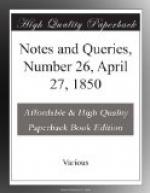The references which Mr. Singer has given to two works which mention the Oiseau bleu of Bourbon, are very important, as the only other known authority for this extinct bird is the MS. Journal of Sieur D.B., which thus receives full confirmation. May I ask Mr. Singer whether either of these writers mentions the Solitaire as inhabiting Bourbon?
The “Oiseaux appelez Flamands” quoted by Mr. S., are merely Flamingos, and are devoid of interest as regards the present question.
The history of the Dodo’s head at Copenhagen, referred to by Mr. Singer, is fully recorded in the Dodo and its Kindred, pp. 25. 33.
The name Dodo seems to have been first applied to the bird by Sir Thomas Herbert, in 1634, who adds, in his edition of 1638, “a Portuguese name it is, and has reference to her simpleness.” Before that time the Dutch were in the habit of calling it Dodars, Dodaers, Toters, and Dronte. I had already made the same guesses at the etymology of these words as those which Mr. Singer has suggested, but not feeling fully satisfied with them, I put forth my Query VII. for the chance of obtaining some further elucidation.
Mr. Singer’s reasonings on the improbability of Tradescant’s specimen of the Dodo having been a fabrication are superfluous, seeing that the head and foot of this individual are, as is well known, still in existence, and form the subjects of six plates in the Dodo and its Kindred.
In regard to my Query IX. as to the local habitation of the family of Dronte, who bore a Dodo on their shield, it has been suggested to me by the Rev. Richard Hooper (who first drew my attention to this armorial bearing), that the family was probably foreign to Britain. It appears that there was a family named Dodo, in Friesland, a member of which (Augustin Dodo, deceased in 1501) was the first editor of St. Augustine’s works. Mr. Hooper suggests that possibly this family may have subsequently adopted the Dodo as their arms, and that Randle Holme may, by a natural mistake, have changed the name of the family, in his Academy of Armory, from Dodo to the synonymous word Dronte. Can none of your genealogical readers clear up this point?
H.E. Strickland.
* * * * *
DERIVATION OF “STERLING” AND “PENNY”.
Your correspondent suggests (No. 24. p. 384.) an ingenious derivation for the word Sterling; but one which perhaps he has been too ready to adopt, inasmuch as it helped his other derivation of peny, from pecunia or pecus. I quote the following from A short Treatise touching Sheriff’s Accompts, by Sir Matthew Hale: London, 1683:




